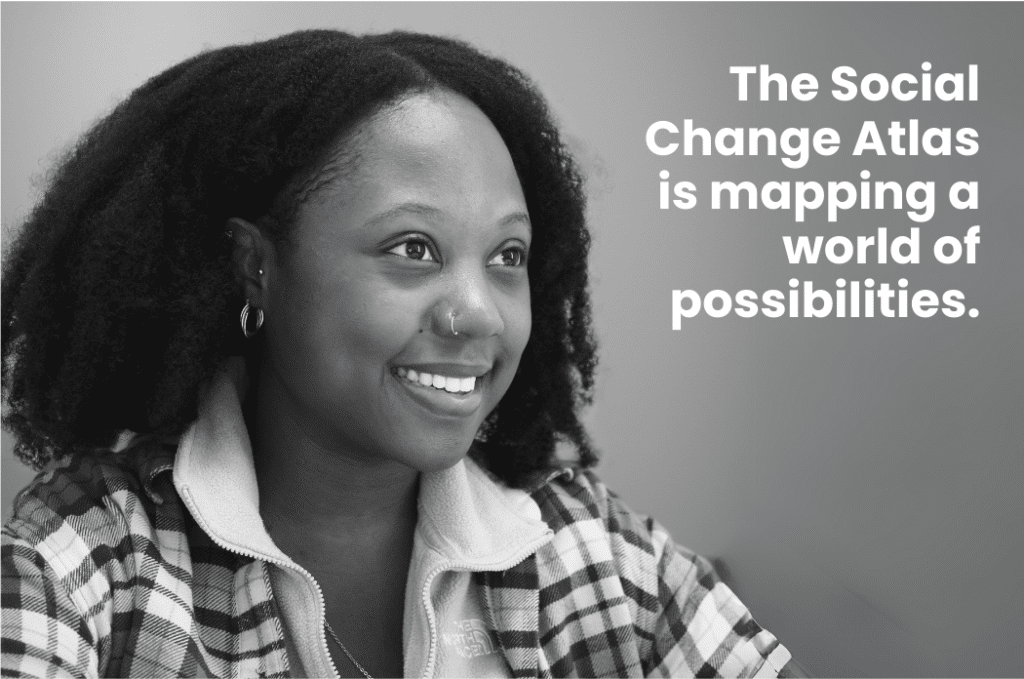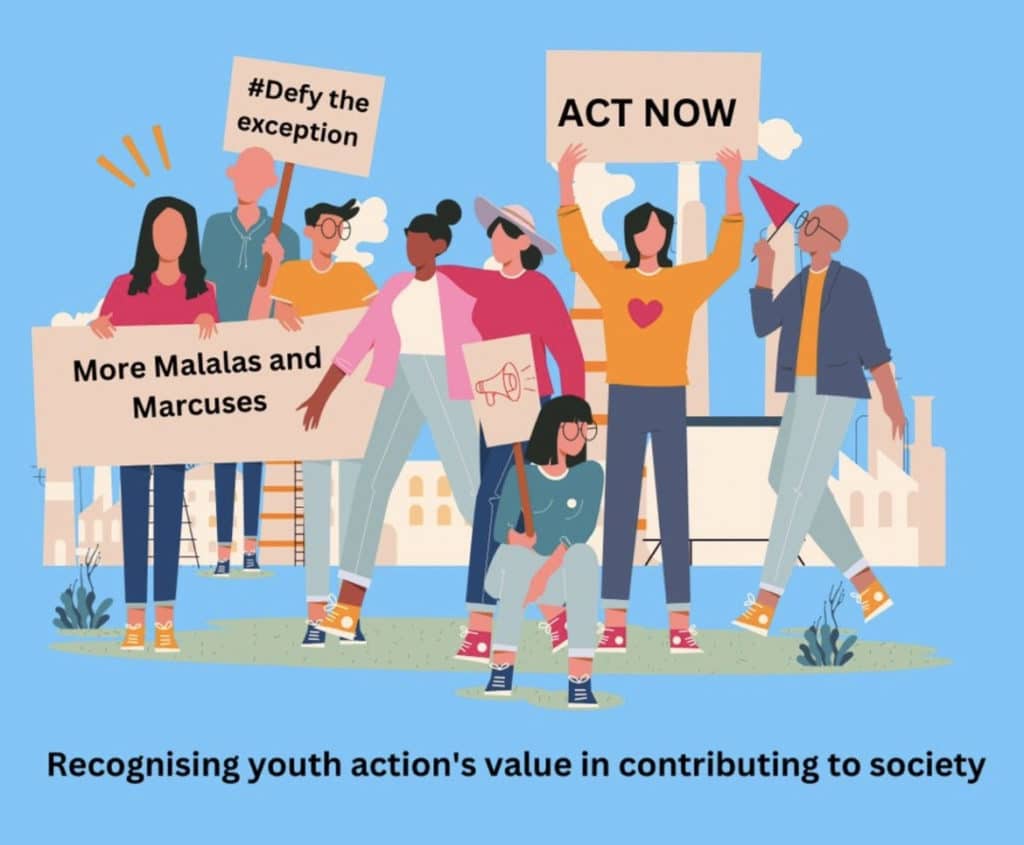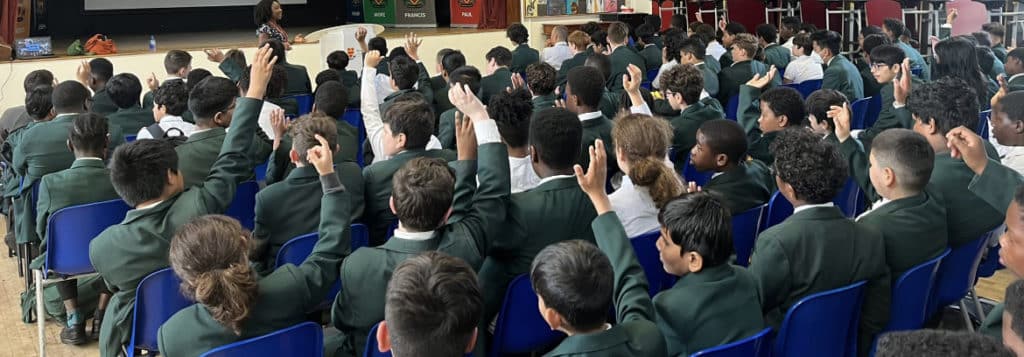
Driven by a desire to make social action accessible, Kimberly Garande is building an app through which young people can learn skills and find opportunities to create change.
“When I first started my campaigning journey, I was still in school, and I never really saw what I was doing as campaigning,” says Kimberly Garande, Founder of the Social Change Atlas. “I remember feeling, at times, isolated and I think that is partly because of my immigration circumstances at the time, there wasn’t a lot that I could do. It wasn’t until my school chaplain offered encouragement and highlighted possibilities of activities that I could do to help in the community that I started doing that myself on a small scale. I was visiting old people’s homes, volunteering at my local church and lending a hand in school projects. It was an escape to be able to do all of these different supportive things in the community.”
It was Kimberly’s experience of volunteering at homes for the elderly that sparked the idea of the Social Change Atlas.
“I noticed that a lot of the residents didn’t go out or didn’t do much sometimes,” recalls Kimberly. “There were certain things they didn’t have the freedom to do and, maybe because some of the services were understaffed, it seemed there was no room for them to offer useful feedback that would actually be heard. So it helped having someone external, such as me, to observe in my time there and make suggestions. Initially, the feedback wasn’t really taken well. It could’ve been because of my age and the fact that I was only visiting a couple of times in the week; therefore I did not know everything in the same way as perhaps staff members who worked there, so my feedback wasn’t always met with positivity. I felt it was important to voice these concerns on behalf of the residents I spent time with in the homes I was visiting. I wanted better living rights for them as I was noticing things that I wouldn’t want to experience.”
When Kimberly, subsequently, went to university, she took on a role as a Culturosity Facilitator during which she learned the term facilitator and realised that the help she was offering the communities she was involved in had a name: campaigning.
“When I looked back at that time in the care home, I thought, actually, in a way what I was doing was campaigning all along,” she says. “A lot of the time I was just doing but not knowing what I was doing. Having language helps you to feel more confident when you push back or you challenge things for the better because that’s what campaigning and changemaking is. I was also experiencing problems with my immigration status, life in the UK, not really understanding my identity and knowing that I wanted to help people but I didn’t know how. I thought, what if there was an app for people that gives you the tools and language about the social justice work that you want to do in your community?
If I had an app like this, then I could think, okay, what is the problem and who’s responsible? What are the different types of changes and is there a language for it? That’s where the idea of the Social Change Atlas came from. I thought it’d be really interesting for young people to not only be fully equipped with tools that allow them to learn more about what campaigning is, what social justice is, what all these terms mean, but also what it means to be a socially engaged citizen in their local community. To find out more about themselves in terms of their role in their local community, what organisations could they be involved in that involve young people in a whole-hearted way? And, if there aren’t any, how can they start their own purposeful projects?”
“This project is for the ordinary young person that just wants to do good.”
With support from the Challenge and Change Fund, Kimberly has been conducting research about young people’s experiences, needs and aspirations as they relate to social action.
“Without this funding, it would have just been an idea that would have stayed in between my group chats with friends and family. There wasn’t any kind of room, financially, to contribute to the dreams or big ideas that I had.
When I applied to Challenge and Change and got the funding, it really made a big difference because I was able to compensate myself and other people that were involved for their time and contributions. I asked young people about what they understand of campaigning and even the terminology in itself, and also about their own journey and what they were looking for. Initially, this project was just based on my own individual experience and understanding my campaign journey, and I thought it wouldn’t make sense for me to create a product around my experiences only because what I want to do is create an app for young people. So I didn’t want to create that without understanding what young people need and also finding the existing information that’s already out there for them.
The Fund massively helped not only in terms of money, but also in terms of networks and it really accelerated the pace and the efficiency of it all. Having an organisation’s backing has been really good and valuable. I’m now at the point of writing a report with my findings from the interviews I did which I’m hoping to use to showcase the potential of this app to other funders as well.”
A crucial observation that Kimberly made during her research is that young people often undervalue their efforts in the face of growing media and public celebration of celebrity activism. In response to this, she is building elements within the app that actively celebrate and underline the value of social action on any scale.
“One of the things I kept seeing was that a lot of young campaigners or activists that are spotlighted tended to be very exceptional. So your Malalas, your Marcus Rashfords, your Greta Thunbergs. And I remember feeling so inadequate in comparison to those people. I was like, well, I’ve not achieved world stage type of change so how does my change matter? This project is for the ordinary young person that just wants to do good or that is already doing good, whether it’s in their community or externally, but I don’t want them to feel so far removed from these amazing examples of people or even historical examples like the individuals who contributed to the civil rights movement or the feminist movements.
The Social Change Atlas is a pathway for young people into taking action locally and envisioning themselves as valuable contributors, even if they don’t have awards or status or money, or all of those things that come with being on a high platform.”
“I want to make it interesting to be socially engaged.”
When it launches, Kimberly hopes that the Social Change Atlas will trigger a surge of confidence in a generation of young people who want to effect change. She believes that, with the free, accessible resources and signposting that the app will provide, these young people will view social action as something to take pride in, and more readily assume positions of leadership.
“I want to make it interesting to be socially engaged amongst other youth,” she says. “If people access the app and find the material, even if they don’t use it this year and they decide to use it later, that will be enough for me. I deeply care about people finding value in contributing to their community. My interests lie in developing spaces where young people can be ordinary and thrive, and feel special from helping other people out.
I know that my expertise and my experiences to date are enough and that there are people out there that will support me. I’ve really valued the experience of working with Blagrave and just having an organisation placing trust in young people and seeing the importance of funding individuals too. There was a flexibility in expectation, they weren’t ever saying ‘this is how we want you to produce things’, and the Challenge and Change Fund increased all the Partners’ funding in recognition of the cost of living crisis. It made a big difference because they weren’t saying, you’ve got the funding, now sort yourselves out, but they were recognising the different areas needed to support us in so they weren’t setting us up to fail. It would be great to see more funders fund the ideas of individuals in this way.
I am building a world of possibility. And I firmly believe that, through this project, there are ample opportunities that ordinary young people can benefit from. I’m also building a world of acceptance in which people feel that they have value and they’re good enough where they’re met, whether it’s at the beginning of their campaigning journey or in the middle, because I don’t think there’s an end. There’s always a possibility to do more. There’s a high likelihood to impact people’s lives positively in whatever role of choice. Yes, there’s a possibility of failing but it’s the learning that will help with continuation and that is never going to be boring. And that’s what I’m really excited for.”
—
If you would like to connect with Kimberly, you can do so on LinkedIn.
–
The Challenge and Change Fund is designed by young changemakers for young changemakers. It funds young people directly, supporting them to create the change they want to see. It prioritises young people who are emergent and have lived experience of the injustices they are trying to change, supporting youth led collectives, social enterprises and CICs across England. You can read more about Challenge and Change here.

